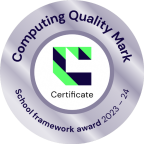Computing
All things are possible for one who believes – Mark 9:23
 Waverley Abbey have been awarded 'The Computing Quality Mark (CQM).'
Waverley Abbey have been awarded 'The Computing Quality Mark (CQM).'
This is an award given to schools that demonstrate high-quality computing education. The CQM is awarded by STEM Learning on behalf of the National Centre for Computing Education (NCCE).
At Waverley Abbey School, it is our aim to prepare children with the skills and knowledge needed to be active participants in an ever changing digital world. Our approach to computing aims to develop a growth-mindset in our pupils with increasingly ambitious challenges as they master the various strands of computing. We equip pupils with the skills vital for their future prospects and to achieve their goals. At Waverley Abbey, we understand that pupils are unique and come to school with their own experiences of computing. Our teaching approach is able to support those who need it, and stretch those who are most able. All pupils develop key skills in computer science, information technology, digital literacy and online safety. This prepares them for their future education and the endless possibilities that the world can offer them.
Children at Waverley Abbey learn to understand how technology works and apply it to solve a range of problems. Our curriculum enables pupils to solve a range of programming problems, understand Internet technologies and express themselves creatively using technology. Computing ensures pupils become digitally literate, to use and express themselves through information technology.
Our school follows the UK Council for Internet Safety’s framework for Education for a Connected World, which means that each child is taught to use the Internet in a safe and respectful way. Children will be confident in their knowledge of what precautions to take to stay safe online and where to seek assistance.
As well as an air-conditioned computing room equipped with a class set of computers, the school has tablets, laptops, classroom PCs and a range of other digital devices. All computers in the school are connected to the school network, with Wi-Fi available across the school.
Curriculum Intent
At Waverley Abbey, we teach computing in order to provide children with the skills needed to be successful in the digital age. These skills will equip the children to become adults who have the freedom to access a range of careers, including those available now and those which are yet to be created. A respectful understanding of using digitals tools, will enable the children to become responsible adults who engage positively with society. The computing curriculum will enhance learning across the school, with strong links to the PSHE curriculum, literacy and mathematical problem-solving. As a school, we will provide education for a connected world, which will teach the children to be responsible citizens, as well as understanding their online identity and complex issues such as copyright and digital ownership. The children will learn to care for their friends and the wider community with the same school values that are taught throughout the school. Our computing curriculum provides children with the building blocks of skills and knowledge that will enable them to progress through the school, building on their previous learning.
Curriculum Implementation
In all year groups, the teachers will plan computing using the year group overview, which is closely matched to the National Curriculum and Education for a Connected World. Additional teaching of online safety takes place during PSHE through Jigsaw, to ensure that it is thoroughly explored and taught explicitly. Most resources come from Kapow Primary, but some units have adapted resources from other places in order to best meet the needs of pupils at Waverley Abbey. An online safety day reinforces the pupils understanding of staying safe online. Class teachers look for informal opportunities throughout the year to discuss online safety with their pupils.
Curriculum Impact
The impact of our curriculum can be seen through children developing skills to be successful in the digital age. They are learning to be respectful and safe online and to engage with others positively. As their skills progress through school, they are developing their skills and knowledge of algorithms and programming to solve problems effectively. These observations have been evidenced by observations of the teaching and learning, scrutiny of the planning and investigation of the work produced by pupils at Waverley Abbey.
Online Safety
For more information about on online safety, we recommend the parent resources that are available on the following websites:
https://www.internetmatters.org
https://www.thinkuknow.co.uk/parents
See our E-Safety page for further information.
If you would like to find out more about the curriculum please make an appointment to see your child's teacher who will be happy to discuss this with you, you can do this by contacting school through the office via - info@waverley-abbey.surrey.sch.uk.
